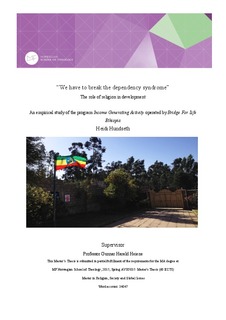"We have to break the dependency syndrome". The role of religion in development. An empirical study of the program Income Generating Activity operated by Bridge For Life Ethiopia
Master thesis
Permanent lenke
http://hdl.handle.net/11250/1587411Utgivelsesdato
2015-10-01Metadata
Vis full innførselSamlinger
Sammendrag
This thesis addresses an empirical study of the non governmental organization (NGO) Bridge
for Life Ethiopia (BLE) and how their implementation of income generating activity (IGA)
can contribution to a sustainable human development of the country. The study will also look
at the way BLE’s religious values are incorporated in the field of development as understood
by the participants and employees of BLE, local community and the local government, known
as the Kebele. My research question is:
What effect does the local Non-Governmental Organization Bridge For Life Ethiopia have on
the Sustainable Human Development in Ethiopia through their Income Generating Activities,
and what role and function does religion have in this social development process?
Using this specific method of income generating activity, Bridge For Life presents a focus on
the family as a whole, empowers the parents to be self-reliable while requiring them to send
all their children to school, through support provided by BLE and income generated by the
parents through the IGA. The research also reveals how Christianity and the role of religion
contribute as a motivational factor for working in development and how it also builds trust
and transformation in the community.
This qualitative and empirical in-depth research can be a contribution to the field of the role
of religion and development. By operating at a local level the research also will contribute to
how sustainability can be achieved, by participating locals in development work, and how
cooperating with the Kebele can form a relationship of trust and transparency.
